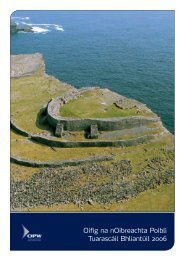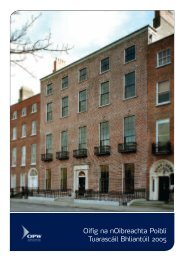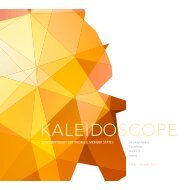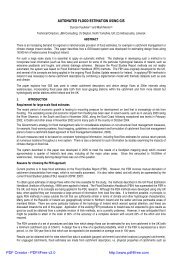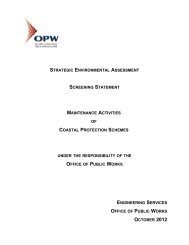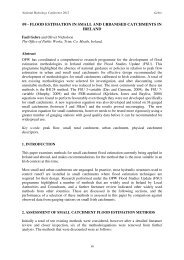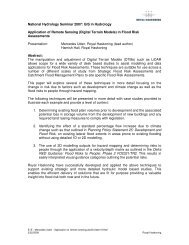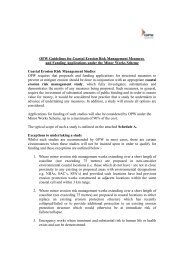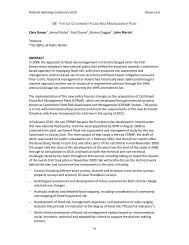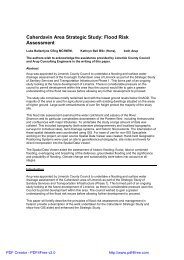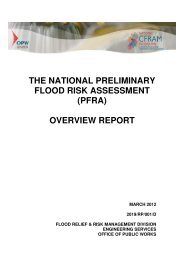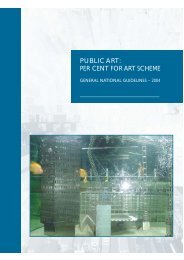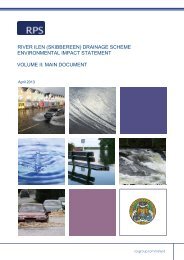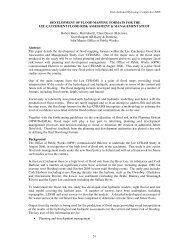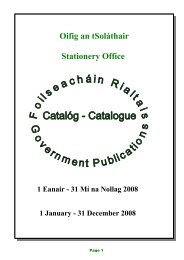Vegetation (Floating River Vegetation) - Office of Public Works
Vegetation (Floating River Vegetation) - Office of Public Works
Vegetation (Floating River Vegetation) - Office of Public Works
You also want an ePaper? Increase the reach of your titles
YUMPU automatically turns print PDFs into web optimized ePapers that Google loves.
extraction <strong>of</strong> floating river vegetation during channel maintenance should be applied where a large<br />
amount <strong>of</strong> floating river vegetation exists especially in watercourses <strong>of</strong> high nutrient levels. This<br />
approach has successfully worked for reed beds (Ní Bhroin, 2004) and should work for channel<br />
maintenance. Removal <strong>of</strong> root material provides expansion space for remaining roots therefore<br />
reducing overcrowding, encouraging regeneration <strong>of</strong> root material resulting in improved nutrient<br />
cycling and reducing the likelihood <strong>of</strong> disease or stressed plant growth.<br />
• In the case <strong>of</strong> large amounts <strong>of</strong> floating river vegetation growth especially in watercourses <strong>of</strong><br />
high nutrient levels ½ to ⅔ <strong>of</strong> the plant material should be removed and placed away from<br />
the watercourse to prevent leaching <strong>of</strong> the nutrients back into the watercourse.<br />
• In the case <strong>of</strong> a moderate amount <strong>of</strong> floating river vegetation less than half should be re-<br />
moved on watercourses with low nutrient levels.<br />
• In the case <strong>of</strong> limited occurrence <strong>of</strong> protected plant species it would be advisable to retain all<br />
growth present.<br />
Other Statutory Bodies: In accordance to REPS 3 Measure 3 “The Protection and Maintenance <strong>of</strong><br />
Waterbodies and Wells” the emphasis is on the maintenance <strong>of</strong> channels with option 3a referring to<br />
the proximity <strong>of</strong> livestock to watercourses. During the course <strong>of</strong> the survey a number <strong>of</strong> smaller<br />
channels, outside the remit <strong>of</strong> the <strong>Office</strong> <strong>of</strong> <strong>Public</strong> <strong>Works</strong>, were found to be recently regraded,<br />
widened and deepened. Raising awareness <strong>of</strong> the nature and methodology <strong>of</strong> regrading and silt<br />
removal work carried out by the <strong>Office</strong> <strong>of</strong> <strong>Public</strong> <strong>Works</strong> under the Environmental Drainage<br />
Maintenance Programme is essential. Incorrect maintenance upstream may impact negatively on<br />
arterial drainage channels downstream.<br />
• The Central Fisheries Board / <strong>Office</strong> <strong>of</strong> <strong>Public</strong> <strong>Works</strong> Environmental Drainage Mainte-<br />
nance Programme should be extended to all drainage work on watercourses. This might be<br />
implemented through REPS.<br />
Other Statutory Bodies: Restricting access <strong>of</strong> livestock to watercourses will reduce the possibility<br />
<strong>of</strong> eutrophication, destruction <strong>of</strong> riverbed by compaction, the prospect <strong>of</strong> floating river vegetation<br />
being eaten by livestock and the erosion <strong>of</strong> riverbanks (important for water parsnip) by excessive<br />
trampling (Northern Ireland Action Plan, O’Grady, 2006, Hatton-Ellis & Grieve, 2003). In fields<br />
not supplied with piped water supplying access to water at the waters edge which is fenced on all<br />
sides (drinking slips) is an acceptable compromise (REPS 3). <strong>River</strong> banks eroded by livestock were<br />
observed favouring terrestrial plant species and not aquatic species. Damage to channel banks<br />
appeared to produce the same effect as the build-up <strong>of</strong> large silt deposits.<br />
46



